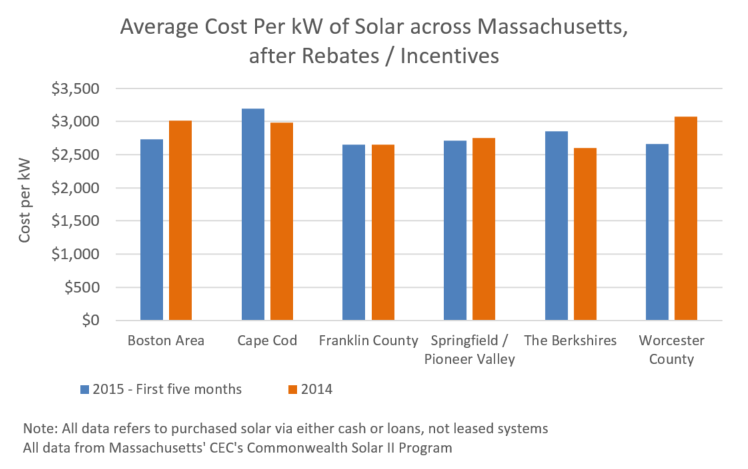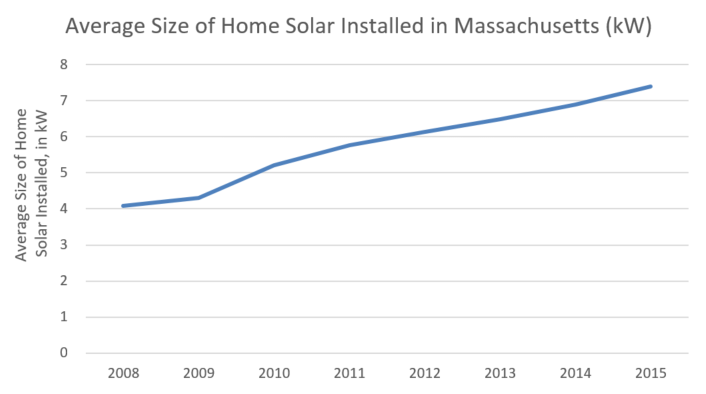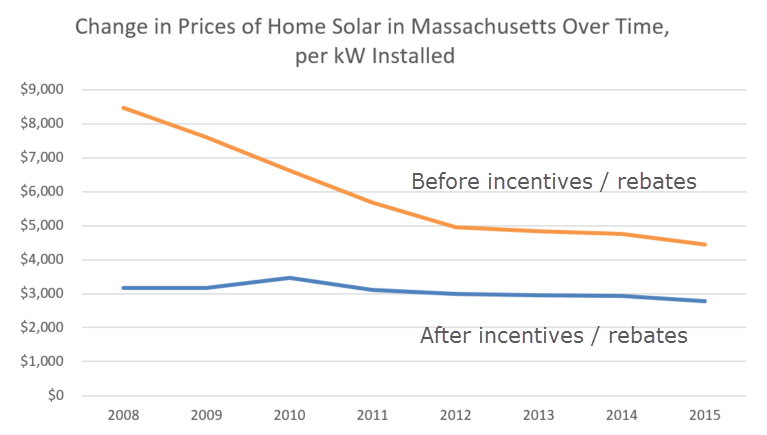How Much do Solar Panels Cost in Massachusetts?
Discover how much you can save today with our solar calculator
How Much Do Solar Panels Cost in Massachusetts in 2019?
Massachusetts is experiencing a boom in home solar, as homeowners make the switch to solar in record numbers. Massachusetts’ extremely high electricity prices, excellent state tax rebates and the ability to sell solar back to the grid (net metering) are all contributing to solar’s growth in the Bay state.
$3.26
Average Cost per Watt in 2019
As of July 2019, the average cost of solar panels per watt in Massachusetts is $3.26 per watt.
$16.680
Average Cost of Home Solar Installation BEFORE tax and credit in Massachusetts in 2019
Average cost of 5 kW home solar system size before incentives and rebates are included. Figures are for purchased systems for the first six months of 2019.
$11,687
Average Cost of Home Solar Installation AFTER tax and credit in Massachusetts in 2019
The average cost of home solar 5 kW after incentives and rebates. Figures are for purchased systems for the first six months of 2019.
Why the Boom in Home Solar in Massachusetts?
- Massachusetts has extremely high electricity costs
- Massachusetts has great incentives to reduce the cost of going solar
- Homeowners can sell any extra electricity from their panels back to their utility.
What is the Cost of Solar Across Massachusetts?
Many homeowners are confused about how much they should expect to pay for solar on their home. While prices vary greatly based on power needs, sun exposure and choice of financing options, we’ve compiled data on the average costs that homeowners in Massachusetts could expect to pay for solar.
We’ve compiled this cost data in our Cost of Solar Index. The graph above shows how much you can expect to pay, on average, per kW (kilowatt) of solar installed in Massachusetts. We also include the price that homeowners are paying on average for entire systems in our individual regional summary pages.
The Price of Solar in MA is Falling, and the Average Size of Home Solar Installations is Growing
As solar prices have fallen and power prices have increased, Massachusetts homeowners have purchased larger and larger solar systems. In 2008, the average size of solar installations across the state was roughly 4.1 kW, and in 2015 to 2019 that number has climbed 81% to 7.4 kW.
The Cost of Solar is Dropping Rapidly in Massachusetts
The price of solar is dropping across the US, and Massachusetts is no exception. The cost of solar before incentives and rebates across Massachusetts has fallen by 47% since 2008, and the cost after incentives and rebates has fallen by 13%.
Why Are so Many Homeowners Switching to Solar in Massachusetts?
Massachusetts Power Costs – Some of the Highest in the Country
The price of power has skyrocketed in the Bay State, and is among the highest in the U.S. Prices have increased 79% from 2004 – 2015, from 10.9 cents per kWh in 2004 to 19.52 cents per kWh in 2015. You can learn more about current power prices in Massachusetts here.
Power price increases like these are a huge part of the appeal of solar to homeowners. Switching to solar allows you to lock in the price of electricity for the life of the panels, protecting you from increasing utility prices.
Incentives and Tax Rebates for Solar in Massachusetts
Massachusetts has several incentives that help solar homeowners when installing solar.
Solar installations in Massachusetts pay no sales tax. This can be quite substantial for a $15,000 installations.
Massachusetts also offers a state tax credit, the Residential Renewable Energy Tax Credit, which provides homeowners with an income tax credit of up to $1,000 on their state tax bill.
Massachusetts has an SREC market – essentially, SRECs are credits for producing solar energy. Utilities will buy these SRECs from homeowners, generating significant income (sometimes $1,000s of dollars), yearly.
Net Metering is Available in Massachusetts
Massachusetts allows net metering, which is the ability to sell excess power your solar panels produce back to the electric grid. During the summer, many homeowners accrue significant credits on their electric bill, which then can heavily offset energy bills during the winter. You can learn more about Massachusetts net metering policies here.





